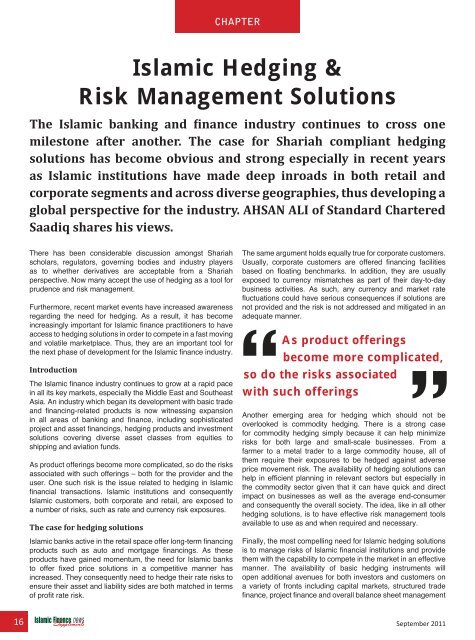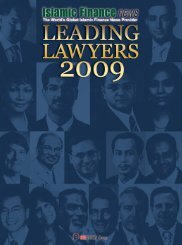Islamic Investor: Islamic Investor: - Islamic Finance News
Islamic Investor: Islamic Investor: - Islamic Finance News
Islamic Investor: Islamic Investor: - Islamic Finance News
You also want an ePaper? Increase the reach of your titles
YUMPU automatically turns print PDFs into web optimized ePapers that Google loves.
CHAPTER<br />
<strong>Islamic</strong> Hedging &<br />
Risk Management Solutions<br />
The <strong>Islamic</strong> banking and finance industry continues to cross one<br />
milestone after another. The case for Shariah compliant hedging<br />
solutions has become obvious and strong especially in recent years<br />
as <strong>Islamic</strong> institutions have made deep inroads in both retail and<br />
corporate segments and across diverse geographies, thus developing a<br />
global perspective for the industry. AHSAN ALI of Standard Chartered<br />
Saadiq shares his views.<br />
There has been considerable discussion amongst Shariah<br />
scholars, regulators, governing bodies and industry players<br />
as to whether derivatives are acceptable from a Shariah<br />
perspective. Now many accept the use of hedging as a tool for<br />
prudence and risk management.<br />
Furthermore, recent market events have increased awareness<br />
regarding the need for hedging. As a result, it has become<br />
increasingly important for <strong>Islamic</strong> fi nance practitioners to have<br />
access to hedging solutions in order to compete in a fast moving<br />
and volatile marketplace. Thus, they are an important tool for<br />
the next phase of development for the <strong>Islamic</strong> fi nance industry.<br />
Introduction<br />
The <strong>Islamic</strong> fi nance industry continues to grow at a rapid pace<br />
in all its key markets, especially the Middle East and Southeast<br />
Asia. An industry which began its development with basic trade<br />
and fi nancing-related products is now witnessing expansion<br />
in all areas of banking and fi nance, including sophisticated<br />
project and asset fi nancings, hedging products and investment<br />
solutions covering diverse asset classes from equities to<br />
shipping and aviation funds.<br />
As product offerings become more complicated, so do the risks<br />
associated with such offerings – both for the provider and the<br />
user. One such risk is the issue related to hedging in <strong>Islamic</strong><br />
fi nancial transactions. <strong>Islamic</strong> institutions and consequently<br />
<strong>Islamic</strong> customers, both corporate and retail, are exposed to<br />
a number of risks, such as rate and currency risk exposures.<br />
The case for hedging solutions<br />
<strong>Islamic</strong> banks active in the retail space offer long-term fi nancing<br />
products such as auto and mortgage fi nancings. As these<br />
products have gained momentum, the need for <strong>Islamic</strong> banks<br />
to offer fi xed price solutions in a competitive manner has<br />
increased. They consequently need to hedge their rate risks to<br />
ensure their asset and liability sides are both matched in terms<br />
of profi t rate risk.<br />
The same argument holds equally true for corporate customers.<br />
Usually, corporate customers are offered fi nancing facilities<br />
based on fl oating benchmarks. In addition, they are usually<br />
exposed to currency mismatches as part of their day-to-day<br />
business activities. As such, any currency and market rate<br />
fl uctuations could have serious consequences if solutions are<br />
not provided and the risk is not addressed and mitigated in an<br />
adequate manner.<br />
As product offerings<br />
become more complicated,<br />
so do the risks associated<br />
with such offerings<br />
Another emerging area for hedging which should not be<br />
overlooked is commodity hedging. There is a strong case<br />
for commodity hedging simply because it can help minimize<br />
risks for both large and small-scale businesses. From a<br />
farmer to a metal trader to a large commodity house, all of<br />
them require their exposures to be hedged against adverse<br />
price movement risk. The availability of hedging solutions can<br />
help in effi cient planning in relevant sectors but especially in<br />
the commodity sector given that it can have quick and direct<br />
impact on businesses as well as the average end-consumer<br />
and consequently the overall society. The idea, like in all other<br />
hedging solutions, is to have effective risk management tools<br />
available to use as and when required and necessary.<br />
Finally, the most compelling need for <strong>Islamic</strong> hedging solutions<br />
is to manage risks of <strong>Islamic</strong> fi nancial institutions and provide<br />
them with the capability to compete in the market in an effective<br />
manner. The availability of basic hedging instruments will<br />
open additional avenues for both investors and customers on<br />
a variety of fronts including capital markets, structured trade<br />
fi nance, project fi nance and overall balance sheet management<br />
16 September 2011

















